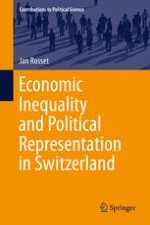2016 | OriginalPaper | Buchkapitel
2. Electoral Democratic Representation and the Market Economy: Irreconcilable Assumptions, Driving Forces and Outcomes
verfasst von : Jan Rosset
Erschienen in: Economic Inequality and Political Representation in Switzerland
Aktivieren Sie unsere intelligente Suche, um passende Fachinhalte oder Patente zu finden.
Wählen Sie Textabschnitte aus um mit Künstlicher Intelligenz passenden Patente zu finden. powered by
Markieren Sie Textabschnitte, um KI-gestützt weitere passende Inhalte zu finden. powered by
